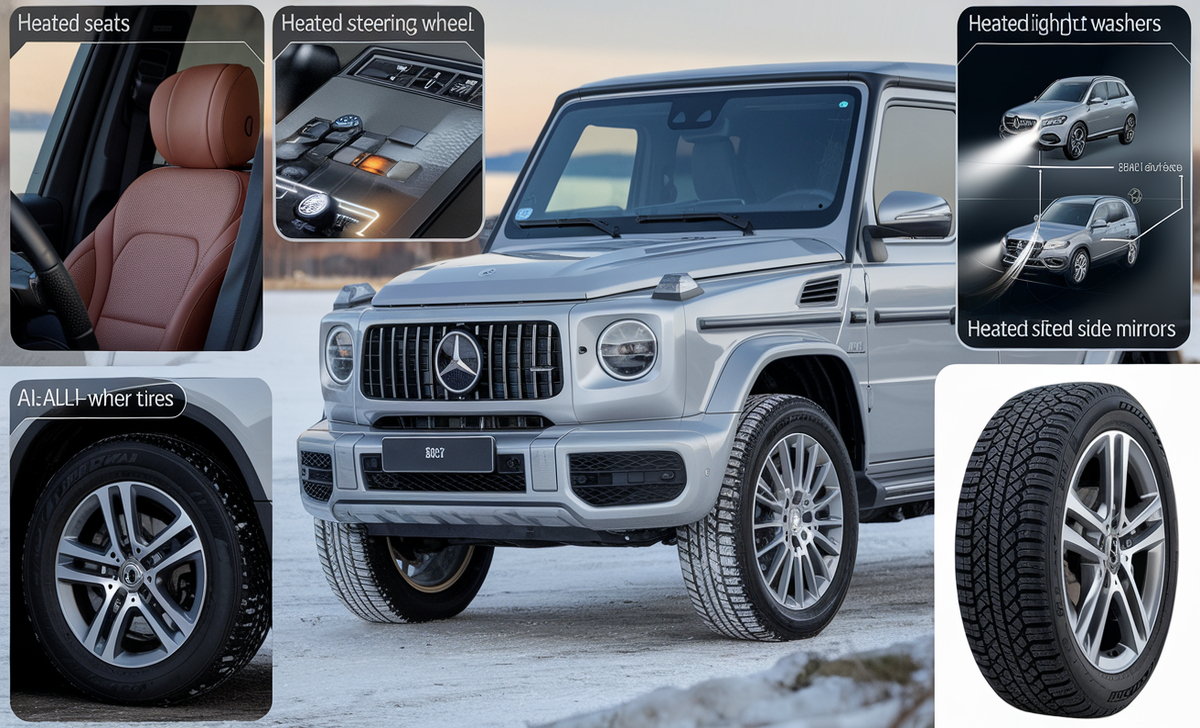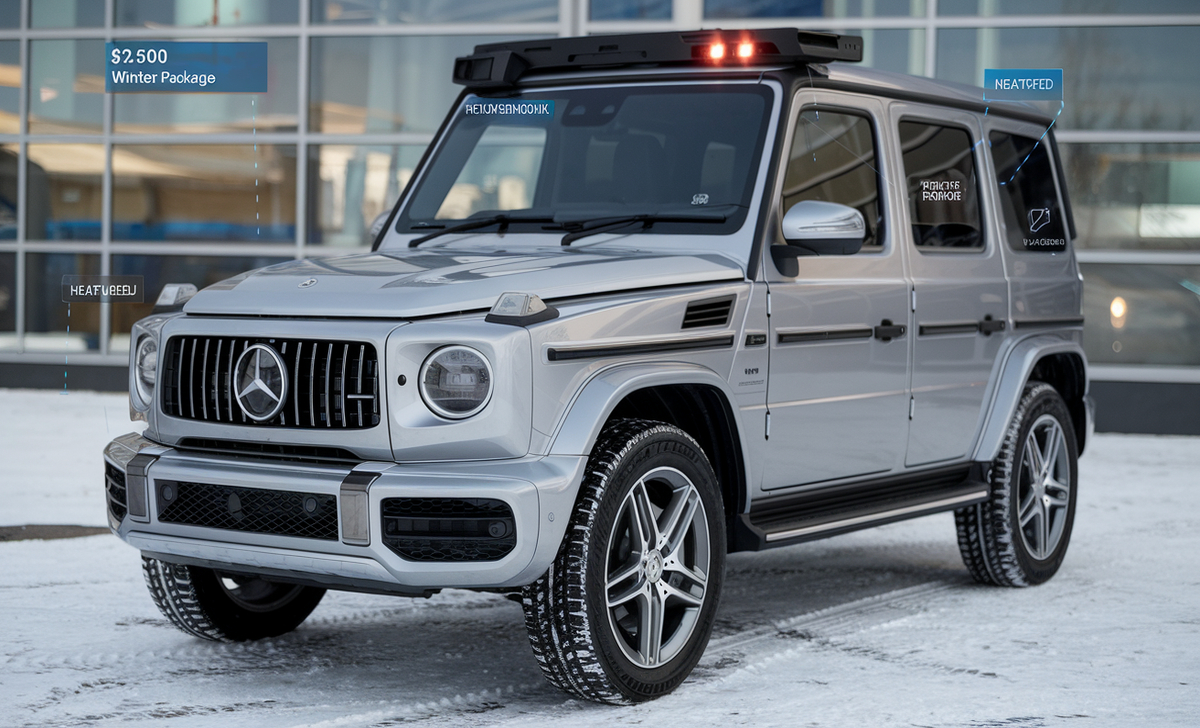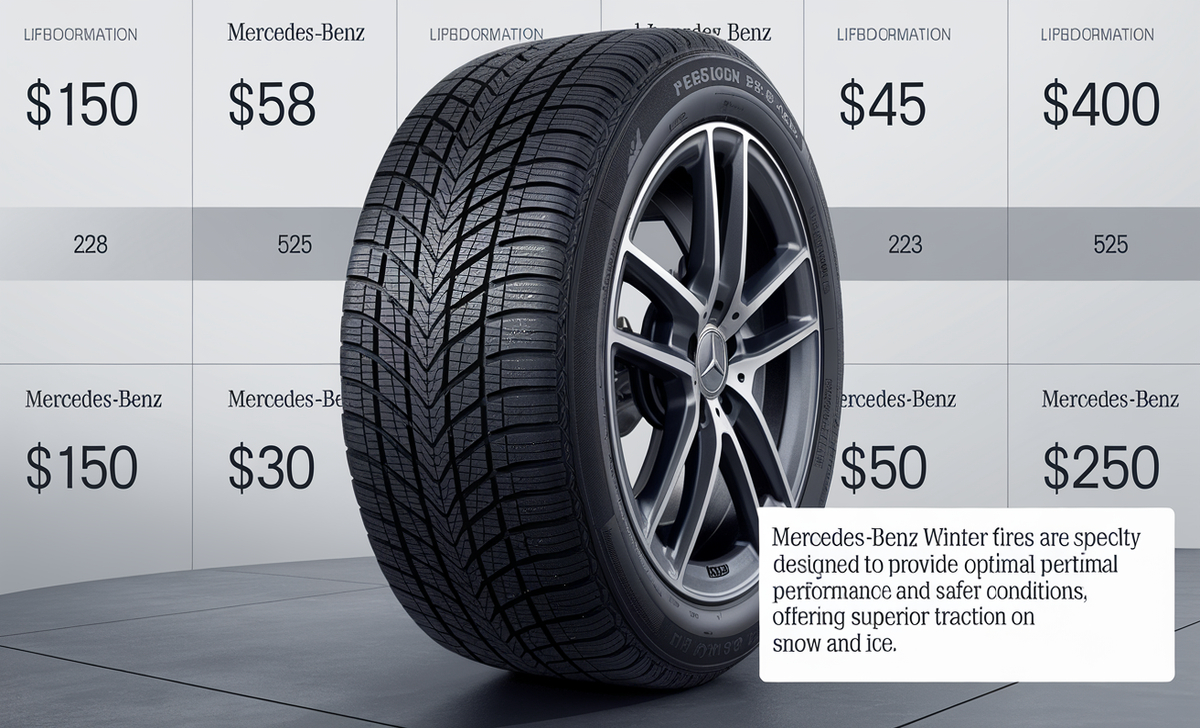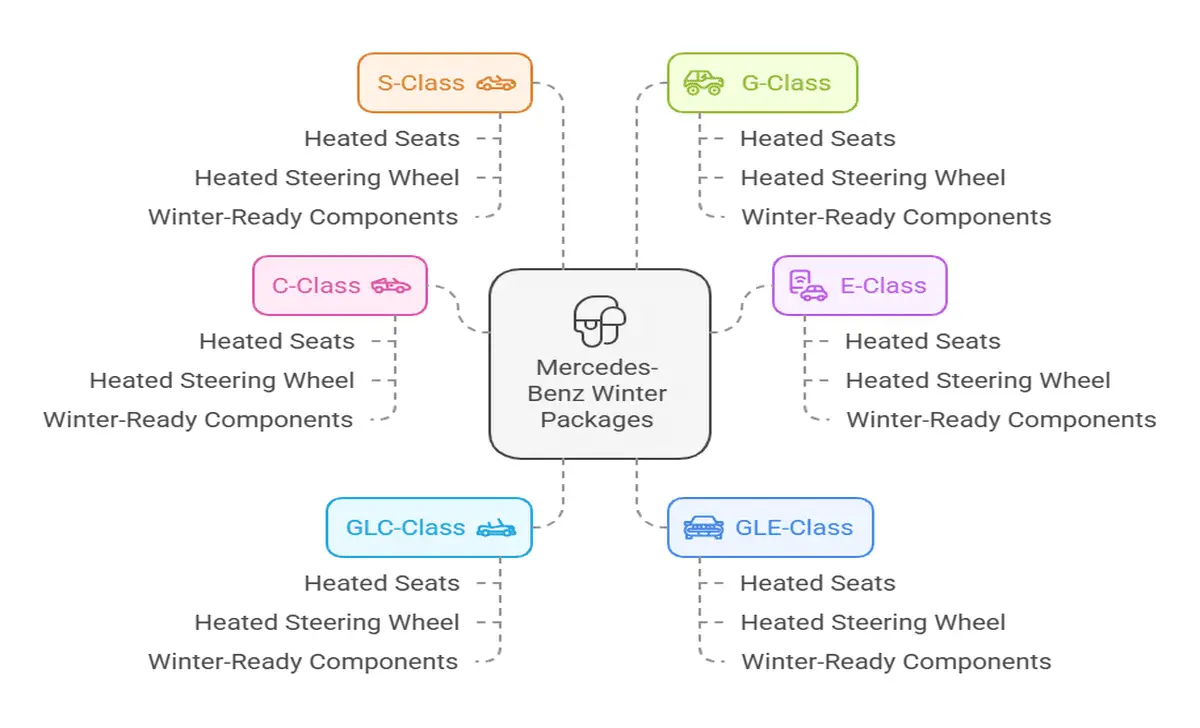The Mercedes-Benz Winter Package is a specialized upgrade designed to enhance your vehicle’s performance and safety during cold-weather conditions.
Prepare your Mercedes-Benz for winter’s toughest challenges with the Winter Package. It typically includes heated seats, a heated steering wheel, a heated windshield washer system, all-wheel drive (4MATIC), and other winter-specific enhancements. This premium upgrade features high-performance winter tires designed to deliver exceptional grip and stability on snowy and icy roads.
Engineered for drivers who face harsh winter conditions regularly, the Winter Package enhances your vehicle’s safety and driving comfort, ensuring that you stay in control and confident, no matter the weather.

Key Highlights
- Tailored for optimal performance in snowy and icy conditions.
- Usually includes heated seats, a heated steering wheel, and heated side mirrors for maximum comfort.
- Often features headlight washers to maintain visibility in challenging weather.
- May incorporate an All-Wheel Drive (AWD) system for superior traction.
- Frequently comes equipped with specialized winter tires for enhanced grip and handling.
Key Features Of The Mercedes-Benz Winter Package

- Heated Seats:
Heated seats provide additional warmth for both the driver and passengers, ensuring a more comfortable ride in cold temperatures. Controlled via buttons located on the seat or the center console, allowing occupants to adjust the temperature to their preference.
- Heated Steering Wheel:
A heated steering wheel keeps the driver’s hands warm, enhancing comfort and control. Activated by a switch, often found on the steering column or dashboard, allowing the driver to turn the feature on or off as needed.
- Heated Side Mirrors:
Heated side mirrors help prevent fogging and ice buildup, ensuring clear visibility. Automatically activated when the rear defroster is turned on, or through a dedicated button on the dashboard.
- Headlight Washers:
Headlight washers keep headlights clean from snow, ice, and road grime, maintaining optimal visibility. Activated automatically when the windshield washers are handy or via a separate control.
- All-Wheel Drive (AWD) System:
The AWD system improves traction and stability on snowy or icy roads, enhancing overall vehicle control. The system distributes power to all four wheels, adjusting torque as needed to maintain grip and prevent slipping.
- Winter Tires:
Winter tires provide better traction, braking, and handling in cold and snowy conditions than all-season tires. They are made from a special rubber compound that remains flexible in low temperatures and feature tread patterns designed to grip snow and ice.
Mercedes Benz Winter Package Price

The price of the Mercedes-Benz Winter Package varies depending on the model and year of the vehicle. On average, you can expect to pay between $1,636.67 – $3,001.42 for this package.
The Winter Package typically includes features such as heated front and rear seats, a heated steering wheel, and heated windshield washer nozzles, enhancing comfort and safety during cold weather driving. For precise pricing and available options, it’s best to consult your local Mercedes-Benz dealership.
Mercedes-Benz Winter Tires And Pricing

Mercedes-Benz winter tires are specifically designed to provide optimal performance and safety in cold weather conditions, offering superior traction on snow and ice. The price of these tyres can vary based on the model and size required, but generally, you can expect to pay between $150 and $400 per tyre.
Investing in high-quality winter tires ensures that your Mercedes-Benz maintains its renowned handling and safety characteristics, even in challenging winter driving conditions.
Different Types Of Mercedes-Benz Models With Winter Package Prices

Mercedes-Benz offers winter packages for various models to enhance driving comfort and safety during the colder months. These packages typically include features such as heated seats, heated steering wheels, heated windshield washers, and additional winter-ready components.
Here are the details on different Mercedes-Benz models with winter packages and their respective prices:
1. Mercedes-Benz C-Class
- Winter Package Price: Approximately $1,000 – $2,000
2. Mercedes-Benz E-Class
- Winter Package Price: Approximately $1,200 – $2,200
3. Mercedes-Benz GLC-Class
- Winter Package Price: Approximately $1,500 – $2,500
4. Mercedes-Benz GLE-Class
- Winter Package Price: Approximately $1,800 – $2,800
5. Mercedes-Benz S-Class
- Winter Package Price: Approximately $2,000 – $3,500
6. Mercedes-Benz G-Class
- Winter Package Price: Approximately $2,500 – $4,000
Conclusion
The Mercedes-Benz Winter Package is an excellent investment for those who face harsh winter conditions. By combining advanced technology and thoughtful features, Mercedes-Benz ensures that drivers can enjoy a safe, comfortable, and reliable driving experience, regardless of the weather.
Whether you are navigating snowy streets or icy highways, the Winter Package equips your Mercedes-Benz to handle the challenges of winter with ease and confidence.
FAQ
1.What Is The Difference Between The Mercedes Benz Winter Package And Regular Tyres?
The Mercedes-Benz winter package typically includes specialized winter tires designed for enhanced traction, handling, and safety in cold, snowy, or icy conditions.
These tires feature deeper treads and softer rubber compounds that remain flexible in low temperatures. In contrast, regular tires, often all-season, feature a broader range of conditions but may not perform as effectively in extreme winter weather.
2.What Is The Lifespan Of The Tyres Included In The Mercedes Benz Winter Package?
The lifespan of tires included in the Mercedes-Benz winter package typically ranges from 3 to 6 years, depending on factors like driving conditions, maintenance, and tire type.
3.Are There Any Maintenance Requirements For The Mercedes Benz Winter Package?
Yes, the Mercedes-Benz winter package requires regular maintenance to ensure optimal performance. Key maintenance tasks include checking and replacing winter tires as needed, inspecting the battery and charging system, and ensuring that the windshield washer fluid is suitable for low temperatures.
It’s also important to monitor the antifreeze levels and inspect the brakes, as winter driving can be harsher on them.
4.How Does The Mercedes Benz Winter Package Improve Driving Performance In Winter Conditions?
The Mercedes-Benz Winter Package enhances driving performance in winter conditions by including features like heated seats and steering wheels for comfort, as well as advanced traction control systems and all-weather tires that improve grip on icy and snowy roads.
5.What Is The Installation Process For The Mercedes Benz Winter Package?
The installation process for the Mercedes-Benz winter package typically involves a few key steps. First, ensure your vehicle is parked on a flat surface and the engine is off. Next, consult the owner’s manual for specific instructions related to your model.
The package usually includes winter tires, which should be mounted on the vehicle’s wheels. Use a jack to lift the car, remove the existing tires, and replace them with the winter tires. Finally, check tire pressure and alignment. It’s advisable to have a professional install safety and compliance with warranty requirements.
6.What Is The Customer Satisfaction Rating For The Mercedes Benz Winter Package?
The customer satisfaction rating for the Mercedes-Benz winter package typically varies based on individual experiences and specific models.
Generally, reviews highlight features like improved traction, enhanced comfort, and overall driving performance in winter conditions. Online ratings often average around 4 to 4.5 out of 5 stars, with many customers appreciating the added safety and convenience.
7.How Long Does It Take To Install The Mercedes Benz Winter Package?
The installation time for the Mercedes-Benz Winter Package typically ranges from 1 to 2 hours, depending on the specific components included and the vehicle model.
It’s advisable to have the installation performed by a certified Mercedes-Benz technician to ensure proper fitting and functionality. Always consult your owner’s manual or your dealership for more precise information related to your vehicle.